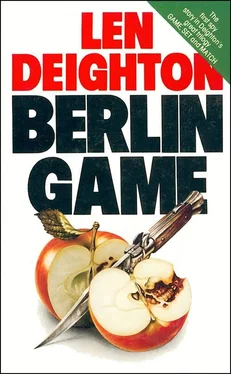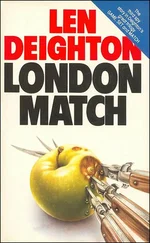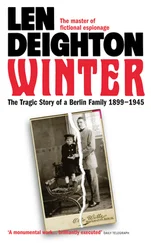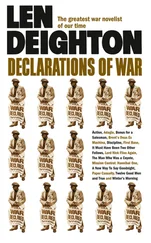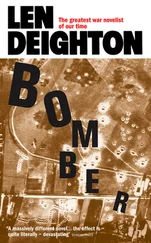Len Deighton - Berlin Game
Здесь есть возможность читать онлайн «Len Deighton - Berlin Game» — ознакомительный отрывок электронной книги совершенно бесплатно, а после прочтения отрывка купить полную версию. В некоторых случаях можно слушать аудио, скачать через торрент в формате fb2 и присутствует краткое содержание. Жанр: Триллер, на английском языке. Описание произведения, (предисловие) а так же отзывы посетителей доступны на портале библиотеки ЛибКат.
- Название:Berlin Game
- Автор:
- Жанр:
- Год:неизвестен
- ISBN:нет данных
- Рейтинг книги:4 / 5. Голосов: 1
-
Избранное:Добавить в избранное
- Отзывы:
-
Ваша оценка:
- 80
- 1
- 2
- 3
- 4
- 5
Berlin Game: краткое содержание, описание и аннотация
Предлагаем к чтению аннотацию, описание, краткое содержание или предисловие (зависит от того, что написал сам автор книги «Berlin Game»). Если вы не нашли необходимую информацию о книге — напишите в комментариях, мы постараемся отыскать её.
Berlin Game — читать онлайн ознакомительный отрывок
Ниже представлен текст книги, разбитый по страницам. Система сохранения места последней прочитанной страницы, позволяет с удобством читать онлайн бесплатно книгу «Berlin Game», без необходимости каждый раз заново искать на чём Вы остановились. Поставьте закладку, и сможете в любой момент перейти на страницу, на которой закончили чтение.
Интервал:
Закладка:
We walked slowly along the track for what seemed like hours. Sometimes Frank stopped to listen, but there was only the sudden scratching sounds of rats and the ceaseless hum of electricity.
'We'll wait here for a bit,' said Frank. He held his wristwatch close to his face. 'Some nights there are East Berlin railway engineers going down the track to check the apparatus at the terminal – what used to be Kaiserhof station. Thälmannplatz, they call it nowadays. The Communists like to name the streets and stations after heroes, don't they?' Frank switched on his lamp long enough ta show a recessed space in the wall of the tunnel, containing a yellow-painted metal box with a telephone in it. This was one of the places the drivers had to come to if their train stopped between stations. There was a bench there too, and Frank sat down. We were not far below street level and I could feel a cold draft coming down the air shaft.
'Ever wonder why the Berlin Wall follows that absurd line?' said Frank. 'It was decided at a conference at Lancaster House in London while the war was still being fought. They were dividing the city up the way the Allied armies would share it once they got here. Clerks were sent out hotfoot for a map of Berlin but the only thing Whitehall could provide was a 1928 city directory, so they had to use that. They drew their lines along the administrative borough boundaries as they were in 1928. It was only for the purposes of that temporary wartime agreement, so it didn't seem to matter too much where it cut through gas pipes, sewers and S-Bahn or these underground trains either. That was in 1944. Now we're still stuck with it.' We were sitting in the dark. I knew Frank was dying for a puff at that damned pipe, but he didn't succumb to the temptation. He talked instead.
Frank said, 'Years back, when the Communists started building that incredible great satellite city at Marzahn, they wanted it to have its own administration and become a Stadtbezirk , a city borough in its own right. But the Communist lawyers sat down with the men from Moscow and went through those old wartime agreements. The outcome was that they were told on no account to create a new Bezirk . By breaking the old agreement, they would open the way for the Western Powers to make changes too.'
'Lawyers run the world,' I said.
'I'm going to let you out into the street at Stadtmitte station,' Frank said. He'd told me all about it, shown me a map and photos, but I didn't interrupt him when he told me everything all over again. 'Stadtmitte is an intersection. East German trains and West German trains both pass through. On different levels, of course.'
'How long now, Frank?'
'Relax. We must wait until we're sure the East Germans are not repairing their track. They're not armed but they sometimes have radios to talk to the men who switch off the juice. They have to be sure the lengthmen won't be electrocuted when they start work.'
We waited in the darkness for what seemed an age. Then we walked slowly along the tunnel again. 'In 1945, the Red Army – fighting their way into the city – were held up at Stadtmitte U-Bahn station,' said Frank. 'The station was being used as headquarters by the SS Division Nordland. They were the last German regulars holding out, and they weren't very German. Nordland had become a collection of foreign volunteers, including three hundred Frenchmen who'd been sent from another unit. The Germans were shooting from about where we are standing now and the Russians couldn't get down onto the track. You know that old saying about one man can hold off an army if he fights his battle in a tunnel. Well, the Germans were fighting their final battle and it was in a tunnel.'
'What happened?'
'The Russians manhandled a field-artillery piece down the entrance steps, along the platform, and onto the tracks. Then they fired along the tunnel here, and that was the end of the story.' Frank stopped suddenly and held his hand outstretched as a warning to be silent.
He must have had superhuman hearing, for it was only after we'd stood there for a moment or two that I could hear the sounds of voices and a muffled hammering. Frank put his head close to mine and whispered, 'Sounds travel a long way in these old tunnels. Those men are probably no nearer than the old disused platform at Französischestrasse.' He looked round. 'This is where you leave me.' He pointed up to another air shaft. At the top there was the faintest glimmer of grey light seen through a grating. 'But move quietly.'
I stripped off the overalls and passed them to Frank; then I climbed up the narrow air shaft. There were iron rungs set into the brickwork. Some of them were rusted and broken, but I had nothing to carry and I got to the top easily enough. The grating was held in place with rusting bars. It looked immovable.
'Lift it,' said Frank from below me. 'Lift it until you can see the street is clear. Then choose your moment and go.'
I put my hand to the grating and it moved easily enough. It hadn't been cleaned and oiled – Frank was too subtle for anything so obvious – but it had been removed recently and made ready for me to push aside.
'Good luck, Bernard.'
I tossed my working gloves back down the shaft, and then went through the manhole as quickly as I could, but I need not have worried. The Friedrichstadt – the governmental centre of old Berlin – is empty and silent by Western standards, even during the working day. Now there was no one in sight, just the distant sounds of traffic somewhere to the east of the city. For Stadtbezirk Mitte is a Communist fist punched into the West. It is bordered on three sides by the 'anti-Fascist protection barrier', or what the rest of the world calls the Wall. It was close by. Endless batteries of glaring lights kept the open strip of borderland as bright as day, and the scattered light made the darkness overhead grey, like the mist that creeps inland from an ice-cold sea.
Frank had chosen my route with care. The entrance to the air shaft was hidden from passers-by. There was a pile of sand and big heaps of rubble, some building equipment and a small generator trailer belonging to the Electricity Authority. Berlin 's cast-iron manhole covers are very heavy, and by the time this one was back in place I was red-faced and out of breath. I paused for a moment before walking up Charlottenstrasse, intending to cut along the back of the State Opera House parallel to Unter den Linden. I would have to cross the Spree. There was no way of avoiding those bridges, for just as the Wall enclosed this part of Mitte on two sides, the River Spree made up the other two sides of what was virtually a box.
As I got nearer to the State Opera, I saw lights and people. Doors at the back of the building were open and men were carrying huge scenery flats and the statue of a horseman that was recognizably from the last act of Don Giovanni . I crossed the street to keep in the shadows but two policemen walking towards me from the direction of the old Reichsbank building – now the offices of the Central Committee – made me change my mind quickly. If only we hadn't had to wait until the underground trains stopped, I could have mingled with the tourists and those groups of Western visitors who go through Checkpoint Charlie just to visit the theatres or the opera houses for the evening. Some of them were dressed in dinner suits and stiff-fronted shirts, or the flamboyant mess kit of a garrisoned regiment. With them came women in long evening dresses and expensive hairdos. Such visitors provided a glimpse of Western decadence for the bored locals. None of those visitors ever gets asked for papers on the street, but such dress would be rather conspicuous amongst the workers where I was going.
There were very few people to be seen anywhere. I walked north and stopped under the arch at Friedrichstrasse station. There were a couple of noisy men arguing about the satirical cabaret across the road, some railway workers waiting for their shift to begin and some silent African tourists staring at everything. The Weidendamm bridge would be my best bet. It was darker there than on the bridges that went over to the island; too many government buildings being guarded on that side of the city.
Читать дальшеИнтервал:
Закладка:
Похожие книги на «Berlin Game»
Представляем Вашему вниманию похожие книги на «Berlin Game» списком для выбора. Мы отобрали схожую по названию и смыслу литературу в надежде предоставить читателям больше вариантов отыскать новые, интересные, ещё непрочитанные произведения.
Обсуждение, отзывы о книге «Berlin Game» и просто собственные мнения читателей. Оставьте ваши комментарии, напишите, что Вы думаете о произведении, его смысле или главных героях. Укажите что конкретно понравилось, а что нет, и почему Вы так считаете.
